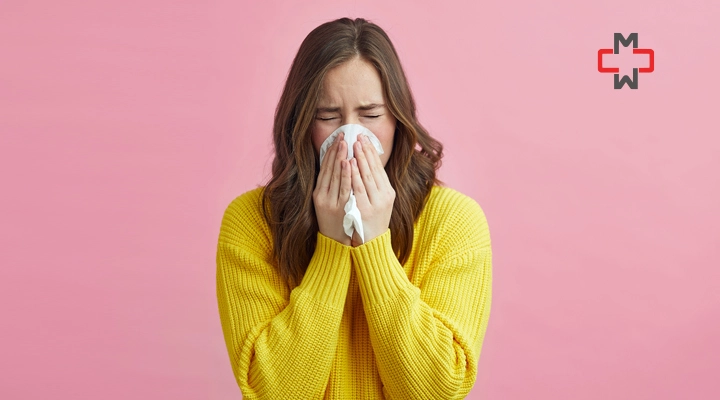Sneezing can hit you out of nowhere. One moment you’re fine, the next you’re in a sneezing fit that just won’t quit. Whether it’s caused by seasonal allergies, indoor allergens, or even a tickle from spicy foods, there are real ways to stop sneezing—and keep it from coming back.
Let’s break it down: what causes sneezing, how to stop it fast, and when it’s time to see a healthcare provider.
What Causes Sneezing?
Sneezing is your body’s way of clearing irritants from your nose and sinuses. The reflex involves your trigeminal nerve, which sends signals from your nose to your brain when something like dust or pollen invades your nasal passages.
Common causes of sneezing include:
- Allergies (like pet dander, pollen, and house dust mites)
- Strong odors (perfume, cleaning chemicals)
- Spicy foods or eating spicy foods
- Dry air or cold weather
- Seasonal changes (especially spring and fall)
- The common cold or viral infections
- Nasal polyps or sinus infections
- Hormonal changes (especially during pregnancy)
- Non allergic rhinitis (irritation without allergy)
When allergens enter your nose, your immune system reacts by releasing histamines, which trigger nasal symptoms like a runny nose, nasal congestion, and, of course, sneezing.
Quick Ways to Stop Sneezing
Need relief ASAP? Try these tips to stop sneezing fast.
1. Blow Your Nose
Use a soft tissue to gently clear your nasal passages. This helps remove the irritants triggering your sneeze reflex.
2. Try a Saline Spray or Neti Pot
Nasal irrigation helps rinse out allergens and mucus. Use a neti pot or sterile saline spray to clean your nose.
3. Use a Nasal Spray
- Antihistamine nasal sprays: Relieve sneezing and itchy nose (e.g., azelastine)
- Steroid nasal sprays: Reduce nasal inflammation and improve nasal congestion (e.g., fluticasone, mometasone)
These sprays help relieve nasal congestion and stop sneezing at the source.
4. Take an Oral Antihistamine
Fast-acting allergy medications like cetirizine, loratadine, or fexofenadine can block histamines and reduce sneezing.
5. Use the Tongue Trick
Press your tongue firmly against the roof of your mouth. It may distract your brain just enough to stop the sneeze.
6. Try Saying a Word (Yes, Really)
Saying a weird word like “pickles” or “pineapple” can sometimes stop a sneeze mid-build. It works for some—give it a shot!
If you’re wondering how to stop sneezing from cold, using humidifiers, drinking warm fluids, and getting rest can soothe your throat and nasal passages and help reduce sneezing. Many people also want to know how to stop sneezing from cold symptoms that linger — the key is supporting your immune system and avoiding cold air or smoke.
If sneezing is paired with a stuffy nose, try combining a decongestant spray with saline irrigation to clear up airflow quickly.
Treating Allergy-Based Sneezing
If your sneezing is from allergic rhinitis, here’s how to manage it:
Identify Your Triggers
Common allergens include:
- Pollen (check local pollen counts)
- Pet dander
- Dust and house dust mites
- Indoor allergens like mold
Control Your Environment
- Stay indoors during high pollen counts
- Use an air purifier with a HEPA filter
- Vacuum regularly with a HEPA vacuum cleaner
- Keep windows closed and change clothes after being outside
- Practice regular cleaning to reduce buildup of allergens like dust and dander
Consider Prescription Treatments
- For more severe symptoms, your doctor may prescribe stronger antihistamines, nasal sprays, or even allergy shots (immunotherapy).
- Ask your provider if you’re a candidate for referral to a clinical immunology specialist.
Want to know how to stop sneezing from allergies? Consistent medication use, allergen avoidance, and keeping indoor air clean with HEPA filters are your best defense. If you’re still wondering how to stop sneezing from allergies after trying over-the-counter meds, talk to your provider about long-term allergy treatment options.
When to See a Doctor
Sneezing once in a while is normal—but ongoing symptoms may signal something more.
Consult a healthcare provider if:
- You have sneezing fits that last days or weeks
- OTC meds and nasal sprays don’t help
- You develop watery eyes, runny nose, itchy nose, or nasal congestion daily
- You suspect nasal polyps or chronic sinus infections
- Your symptoms worsen or new symptoms occur (like cough or asthma)
- You need help managing seasonal allergies
They may recommend:
- Blood tests to check for allergens
- In-office exams of your sinuses and nasal passages
- Advanced treatment options if standard therapies don’t work
📅 Need to speak to a doctor? Book an appointment now (Walk-ins, Online, and Virtual Care Available)
Sneezing FAQ: Real Questions, Quick Answers
How do I stop sneezing ASAP?
Blow your nose, use a saline spray, and take an antihistamine.
Why am I sneezing so much continuously?
Likely allergies, nasal irritation, or a cold. Persistent sneezing may need a doctor’s input.
How do I stop the constant feeling of needing to sneeze?
Use a nasal spray and press your tongue against the roof of your mouth. Try cool air and hydrate.
What’s the best remedy to stop sneezing?
Antihistamines, nasal sprays, and environment control. For chronic cases, consider allergy shots.
Final Thoughts
Sneezing might be natural, but that doesn’t mean you have to live with it. Whether it’s triggered by allergens, a cold, or other irritants, understanding your symptoms, identifying your triggers, and getting the right treatment can help you take control.
Ready to stop sneezing and breathe easier? Schedule an appointment today with Dr. Syra Hanif at Manhattan Medical Arts.
We’re here to help—from the first sneeze to your full recovery.
– Disclaimer –
This blog is for informational & educational purposes only and does not intend to substitute any professional medical advice or consultation. For any health-related concerns, please consult with your physician, or call 911.
-
About The Author
Dr. Syra Hanif M.D.Board Certified Primary Care Physician
Dr. Syra Hanif is a board-certified Primary Care Physician (PCP) dedicated to providing compassionate, patient-centered healthcare.
Read More







